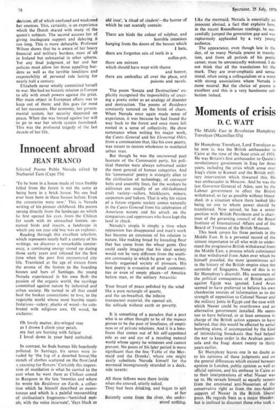Innocent abroad
JEAN FRANCO
Selected Poems Pablo Neruda edited by Nathaniel Tarn (Cape 55s)
'To be born in a house made of trees freshly felled from the forest is not the same as being born in a brick house. No one had ever been born in these houses before. Even the cemeteries were new.' This is Neruda writing of his pioneer childhood. His poems sprang directly from the landscape on which he first opened his eyes, from the Chilean far south with its untouched forests, un- named birds and insects, a landscape• in which any ten year old boy was an explorer.
Reading through this excellent selection, which represents nearly half a century of his writings, we discover a remarkable consist- ency, a continuing energy stored up during those early years and released for the first time when the poet first encountered city life. Translated at the age of sixteen from the aroma of the forests to the boarding houses and bars of Santiago, the young Neruda experienced in his own flesh the passion of the organic world, the sacrilege committed against nature by industrial and urban society. He turned to all that could heal the broken connections: to love, to the vegetable world whose most humble mani- festations—celery, planks of wood—he cele- brated with religious awe. Of wood, he exclaims: Oh lovely matter, dry-winged rose
as I drown I climb your petals,
my feet are burning with fatigue
I kneel down in your hard cathedral.
In contrast, he finds human life hopelessly polluted. In Santiago, his senses were in- vaded by 'the fug of a deserted house/the stench of clothes scattered on the floor/and a yearning for flowers.' Certainly this impres- sion of mutilation is what he carried to the east when he went there as Chilean consul to Rangoon in the late 'twenties and where he wrote his Residence on Earth, a collec- tion which he himself described as mono- tonous and which is a painful reassembling of civilisation's fragments—garnished met- als, with the voice incarnate', 'days black as old iron', 'a ritual of cinders'—the horror of which he can scarcely contain: There are birds the colour of sulphur, and horrible intestines hanging from the doors of the houses which I hate, there are forgotten sets of teeth in a
coffee-pot, there are mirrors which should have wept with shame and horror, there are umbrellas all over the place, and poisons and navels.
The poem 'Sonata and Destructions' ex- plicitly recognised the impossibility of creat- ing a poetic order as an analogy of disorder and destruction. The poems of Residence constantly teetered on the brink of chaos. When Neruda once again made sense of experience, it was because he had found the way back to the forest and once more felt rooted in a sense of collectivity. He drew sustenance when writing his major work, the Canto General and his Elemental Odes, from a communism that, like his own poetry, was meant to restore wholeness to mutilated urban man.
But though he was the uncrowned poet laureate of the Communist party, his poli- tical theories were always subsumed under the most general of human categories. And his 'communist' poetry is strangely alien to the civilisation of technology, of conveyor belts and assembly lines, for the workers he addresses are usually of an old-fashioned craft variety—sailors, bricklayers, miners, carpenters and bakers. That is why his vision of a future organic society comes naturally in the Canto General from his celebration of American nature and his attack on the conquerors and oppressors who have kept the land in check.
Neruda's utopia is simply a time when oppression has disappeared and man's work has become an extension of his relation to nature, like making bread by kneading flour that has come from the wheat germ. One could easily imagine that his ideal society would not be very different from the south- ern community in which he grew up—a free, loosely organised society of pioneers. His best poetry is evocative of small communi- ties or even of empty places—of America before man, or the solitary Antarctic: Your breast of peace polished by the wind like a pure rectangle of quartz, and the un-breathed, the infinite transparent material, the opened air, the solitude without earth or poverty.
It is something of a paradox that a poet who is so often thought to be of the masses proves to be the poet of loneliness, of empti- ness or of private relations. And it is a lone- liness that comes out of his self-appointed role as ear and eye of a receding natural world whose agony he witnesses and cannot prevent. No poem of his later period is more significant than the fine 'Fable of the Mer- maid and the Drunks', where one might easily substitute Neruda himself for the mermaid incongruously stranded in a dock, side tavern: All these fellows were there inside when she entered, utterly naked.
They had been drinking, and began to spit at her Recently come from the river, she under- stood nothing. Like the mermaid, Neruda is essentially an innocent abroad, a fact that explains how, in the recent Roundhouse readings, he suc- cessfully jumped the generation gap and was rapturously applauded by a very young audience.
The appearance, even though late in the day, of so many Neruda poems in transla- tion, and from all periods of his poetic career, must be unreservedly welcomed. I do not think that all the translations hit the mark. They are over-emphatic and sensa- tional, often using a colloquialism or a word with strong associations where Neruda is more neutral. But the choice of poems is excellent and this is a very handsome col- lection indeed.






























 Previous page
Previous page